Thousands of mobile apps are released each day on the Apple App Store and Google Play Store. But each of these apps follows a unique path to development.
Using a mobile app development platform to build your app is the easiest, fastest, and most cost-effective way to bring your app to market. For those of you who don’t know how to code, you can still create an app on your own with an app builder.
Most people don’t have hundreds of thousands of dollars lying around for app development.
That’s why using an app development platform is so appealing. These tools give you the ability to create an app for a fraction of the cost compared to traditional development.
More than 10,000 apps have been built using the BuildFire platform.
If you’re considering an app builder for development, it’s common to have some questions. Lots of people don’t know what to expect from an app development platform, which is what inspired me to create this guide.
Expect Choices
One of the first things you should expect from an app builder is the option of choice. The more choices a mobile app development platform gives you, the better it is.
Do you want to build for iOS? Android? Or Both?
The best platforms let you decide for yourself. Some app builders on the market restrict you and only allow for iOS development. Even if you only want to launch on one operating system today, this will limit your growth down the road. So stay away from those app builders.
You should also expect choices for how your app gets built.
- Do you want to build an app by yourself?
- Would you like some assistance with the initial setup and design?
- Are you looking for a team of experts to build it for you?
With some mobile app platforms, it’s either all or nothing. You’re either completely on your own or you’ll pay someone to do it for you. Again, those choices are a bit restricting.
You’re better off choosing an app development platform that gives you as many development paths as possible. Even if you’d rather build it on your own, you’ll definitely enjoy the convenience of having some assistance if you eventually need some.
Here’s a brief overview of the different development choices you’ll have using our platform.
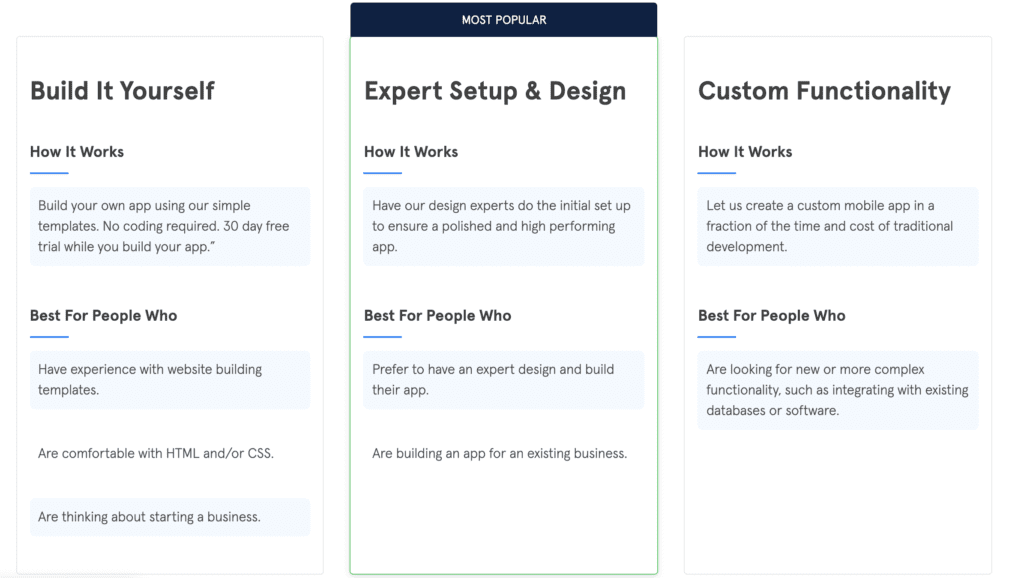
You can get started today and select the option that best fits your needs.
A great app builder gives you the freedom to create any type of app you want. Other platforms might only support certain types of apps. Those cookie-cutter solutions aren’t really scalable or suitable for businesses.
For example, do you want to build an ecommerce app? What about an app for employee communication? Maybe you want to develop an app for your restaurant, school, religious organization, or an event.
While these apps are very different, the best app development platforms can support all of them.
Some app builders are industry-specific. Those solutions won’t be versatile enough to accommodate all of your needs.
Check out the thousands of apps built by our customers. You’ll see that these apps cover a wide range of industries, purposes, and use cases. That’s the power of choice that you should expect.
Expect Helpful Resources
Even if you’re building an app by yourself, you should never be truly alone.
Surprisingly, there are lots of app development platforms on the market today that force you to figure things out on your own. But spending hours, days, or even weeks trying to complete a basic task is not an efficient use of your time.
Imagine trying to do anything new without getting instructions. It’s a recipe for disaster.
Don’t waste valuable productivity time and allow the final version of your app to suffer. Go with a mobile app development platform that provides helpful resources.
- Videos
- Webinars
- Ebooks
- Learning Centers
- Customer Support
These are the types of resources that you should have at your disposal when you’re building an app on your own.
For example, let’s say you’re using BuildFire to create an app. BuildFire University has everything you need to teach yourself how to use the platform.
Here’s a quick screen capture from our tutorial on how to customize your app’s login screen.
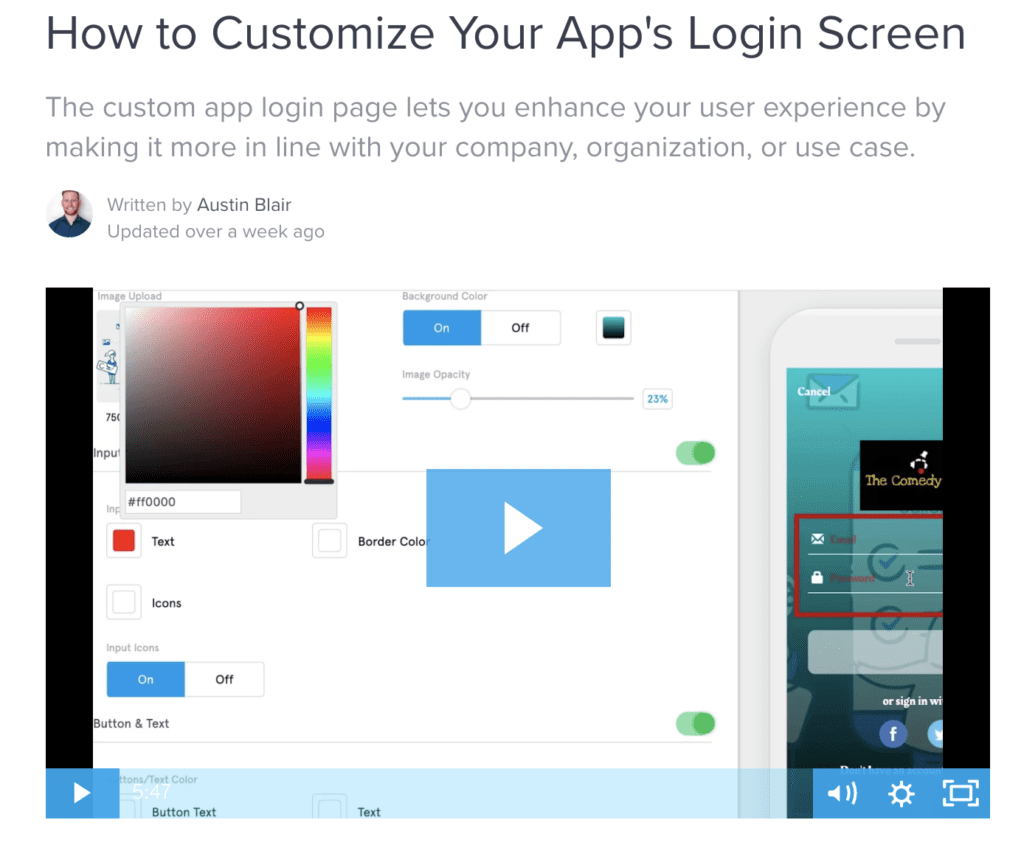
Like most of our guides and resources, it starts with an in-depth video to walk you through the entire procedure.
As you continue scrolling, you’ll the tutorial takes you through the step-by-step process for different functions. Here’s a section from this resource about adjusting the login screen background color.
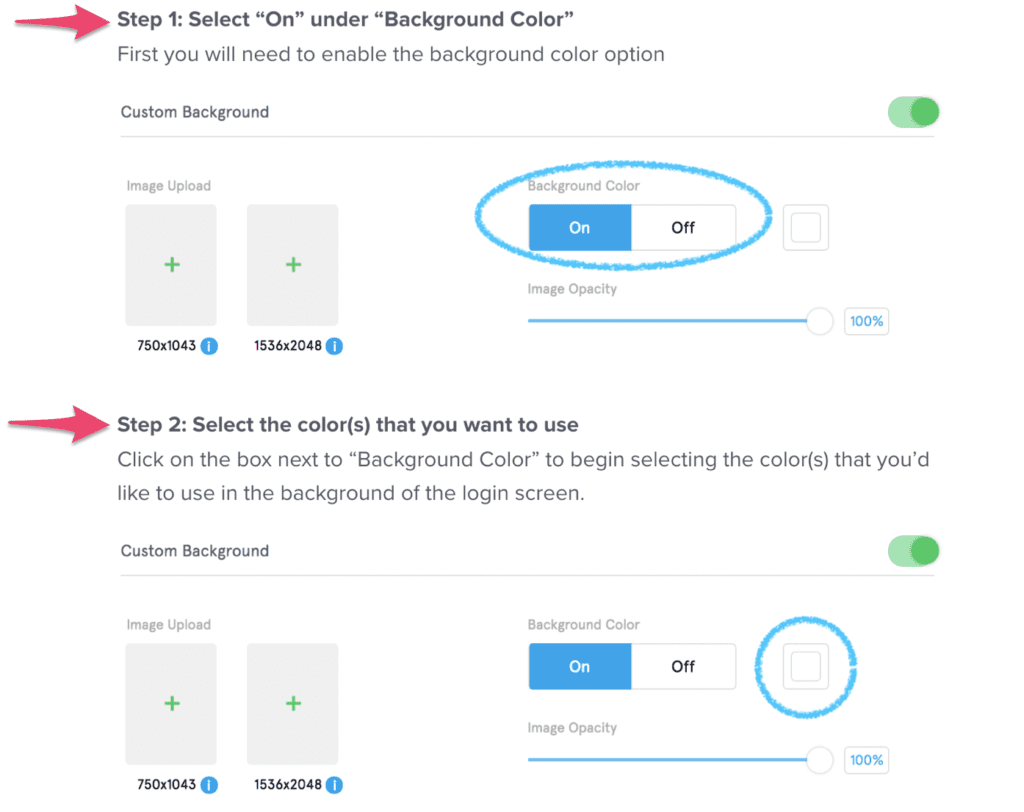
With detailed instructions, videos, and screenshots like this, anyone can learn how to use a mobile app platform.
Even with plenty of self-service tools, the day might come when you’ll need further assistance. When that day arrives, who will you call?
Find a mobile app development platform with a reputation for excellent customer support. Whether it be via phone or email, you want to make sure that you have some way to get an answer fast and efficiently.
Design Templates
Some of you might have experience using website builders. Platforms like Wix make it possible to create a website on your own without much technical knowledge or the ability to code.
You started with a design template and then customized different elements on each page to make it unique for your brand. Simple, right?
A great mobile app development platform functions the same way.
Expect an app builder to have you select a design template in the first step of development.
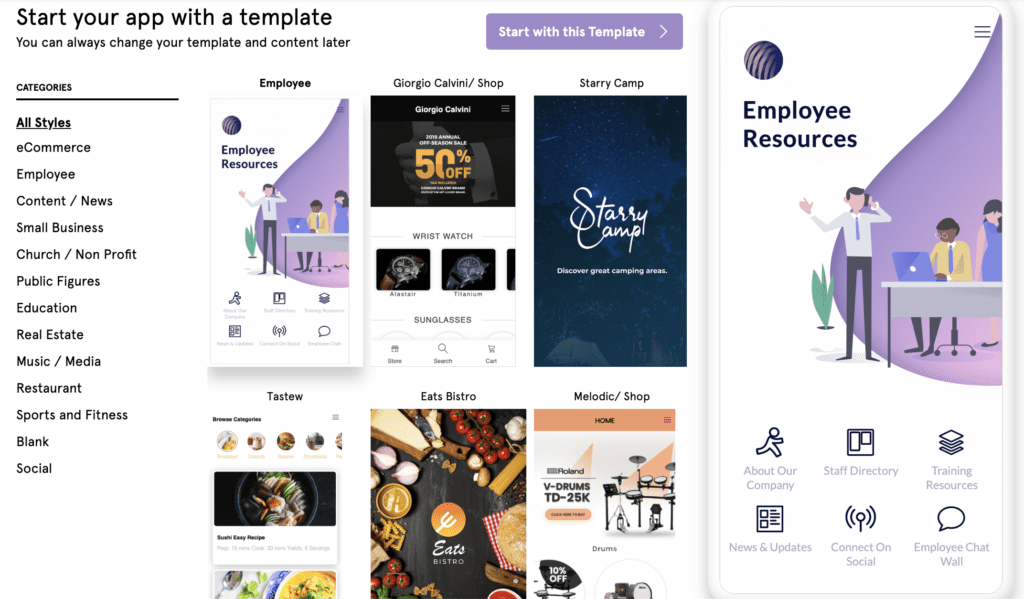
Remember our first expectation? Choices.
Not every app should have the same look, feel, and design. Find an app development platform that gives you lots of choices, like the example above.
A restaurant app, gym app, and ecommerce app will all look very different.
You should be able to browse for a design template by category. Within each category, there should be plenty of options to choose from.
Once you select a template, your design journey should not stop here. Expect your app development platform to give you dozens of custom design choices. Examples include:
- App icons
- Loading screens
- Fonts
- Colors
- Menu alignment
- Backgrounds
- Graphics
- Button height
- Button width
- Button placement
The list goes on and on.
It’s also a nice bonus when the builder gives you preset color schemes to choose from. This ensures that your color scheme is visually appealing, and you can find a preset that matches your brand’s image.
Your app’s design will have a direct impact on its success.
This goes beyond the way it looks. The right design adds functionality to an app, which affects the user experience.
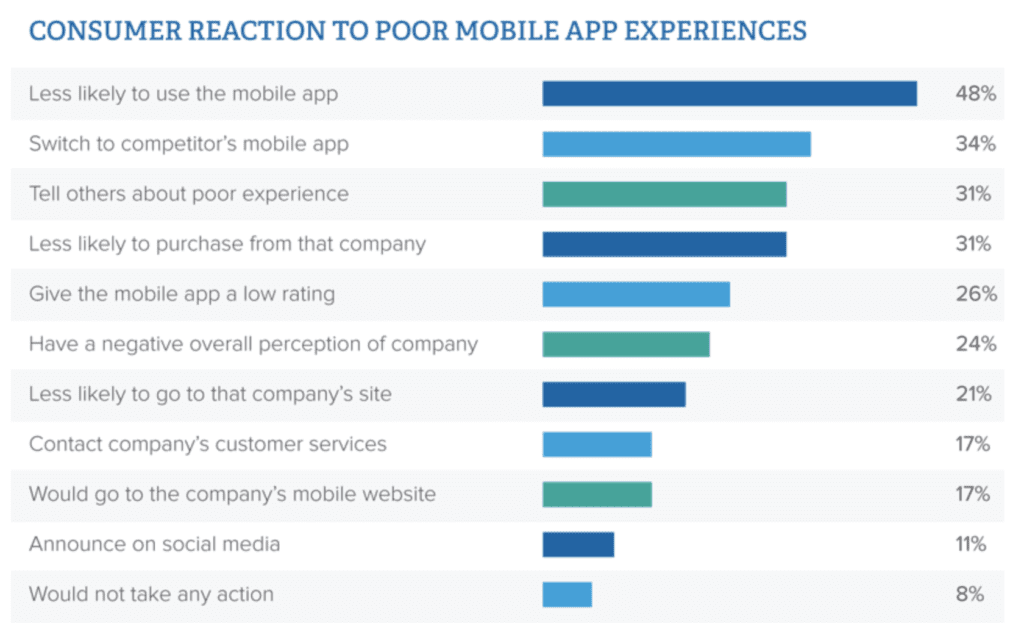
As you can see from the graph, nearly 50% of users are less likely to use an app after a poor experience. This is something that can’t be corrected, which is why your app must have a high-quality design from day one.
That’s why choosing a mobile app development platform with a wide range of design templates is so crucial.
Adding Features Should Be Easy
What’s an app without features?
Expect a mobile app platform to offer a wide range of choices here as well. These will become the driving functions for your app.
Using an app builder with a plugin marketplace will give you a significant advantage.
Basically, any feature you could imagine can be achieved by adding a plugin to your app. All you have to do is maintain the plugins. The technical work behind the scenes will be managed by the app platform.
Examples of feature categories include:
- Social media integration (Facebook, Instagram, Twitter, etc.)
- Content
- Media
- Forms
- Ecommerce
- Customer loyalty
Check out our guide on the top plugins that will make your app successful for some specific suggestions.
Your expectations for a plugin should be very straight forward. Adding a plugin can be accomplished in just one click.
Here’s an example. Let’s say you want to add a contact function to your app. Simply browse the plugin marketplace and click the add button.
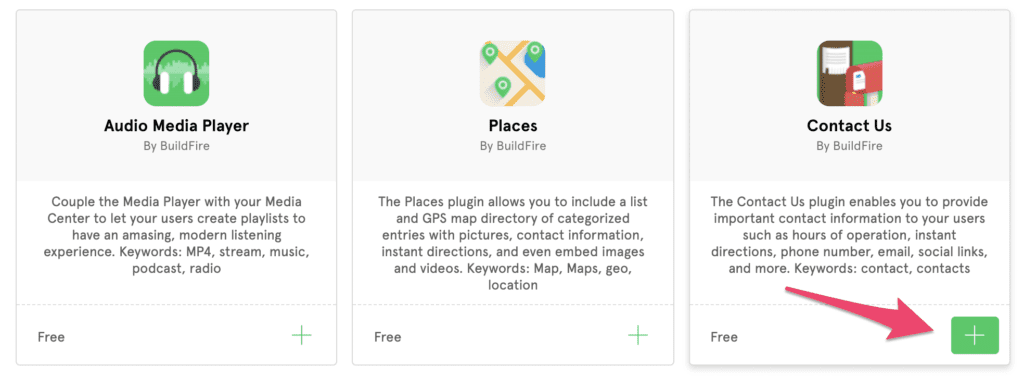
Once added, you can completely customize the plugin with your own information.
Add your address, phone number, images, and even display the location on a map. Then you can preview your app to see the changes in real-time.
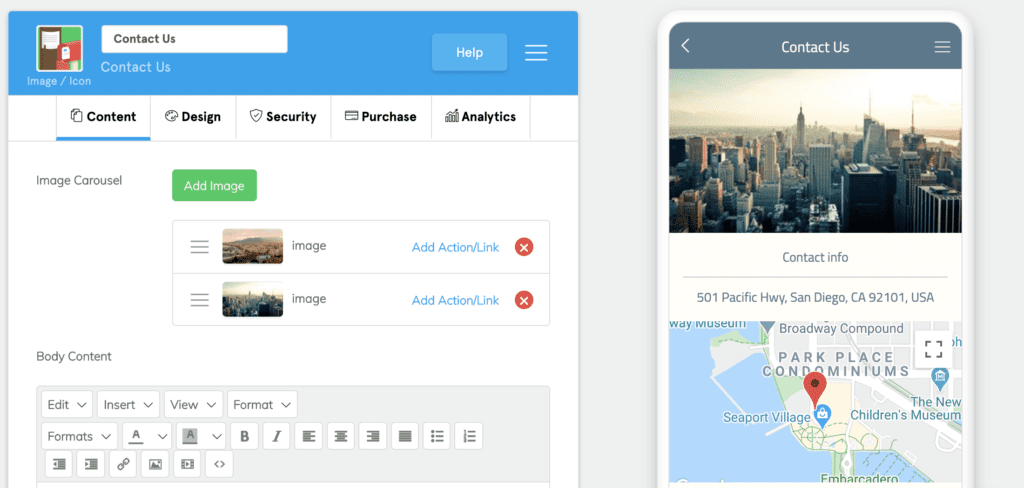
With a plugin like this one, you can add a high-functioning contact page to your app in less than five minutes.
To be clear, not every app development platform has a plugin marketplace like this. So make sure you find one that does.
You’ll also want to make sure that adding a new feature can be accomplished in one or two clicks at most. Once the feature has been added to your app, expect a wide range of customization options.
Don’t Expect to Build an App Overnight
While app builders are generally simple, straightforward, and easy to use, it’s important that you set realistic expectations for yourself.
Expect the development process to take time.
If you think you’re going to build an app in a few days or a week, you’re mistaken. Plan to build an app over the course of at least three months. More sophisticated apps with advanced features and functions could take closer to a year. The majority of you will fall somewhere in between.
In fact, roughly half of apps take about 4-6 months to build.
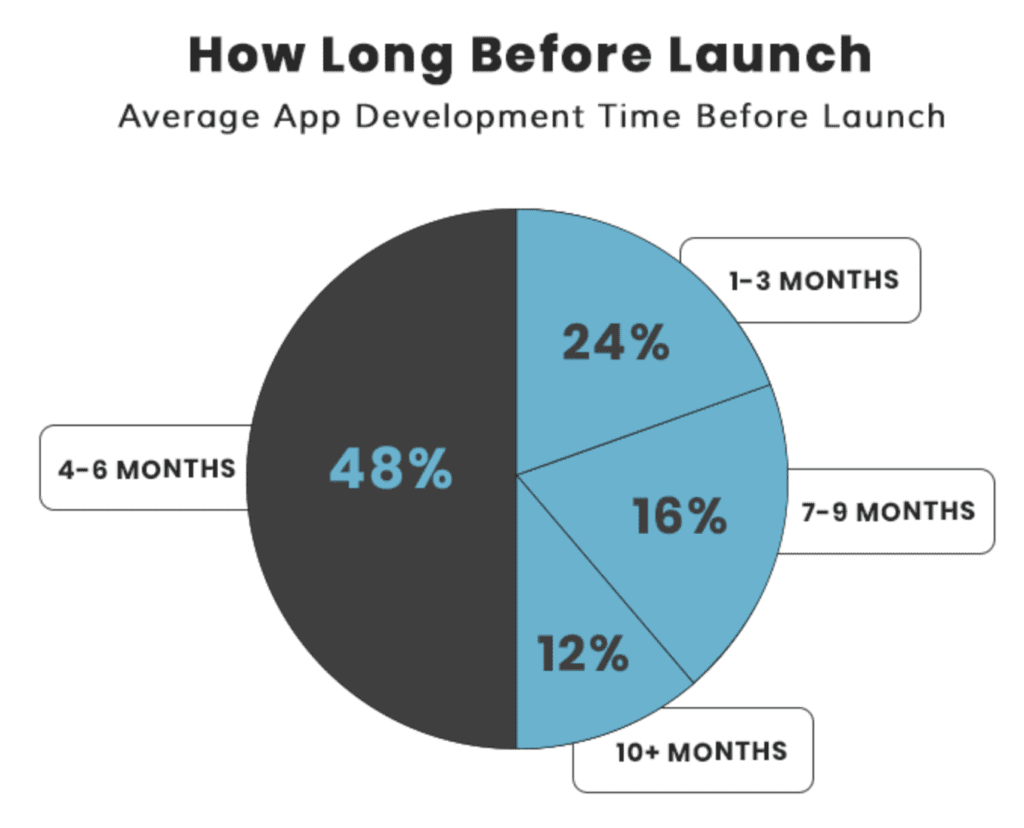
You can review our guide on mobile app development timelines to get more information about this.
Here’s a simple analogy that relates to this process. How long does it take to build a house?
It’s a loaded question. The answer depends on dozens of different factors.
You could probably put up four walls and a roof in less than a month. If it’s a 900 square-foot manufactured one-bedroom home, the process will be quick.
But if you’re talking about a 5,000 square-foot home with six bedrooms, a custom kitchen, pool, and in-home movie theater, it’s going to take significantly longer.
I realize that these are both extreme examples, but app development is very similar. You can build a calculator or flashlight app very quickly. But it would take years to build something as sophisticated as Facebook or Uber.
Just make sure you have realistic expectations about how long it will take to build your app.
Fortunately, an app builder will be much faster than coding an app from scratch. So you’ll have a significant advantage here if the project is time-sensitive.
Expect Publishing Assistance
Let’s fast forward a few months. You finally finished building your app; now what?
Getting your app published on the Apple App Store and Google Play store isn’t the easiest process. But if you’re using a reputable mobile app development platform, you won’t have to worry about any of this.
For those of you considering BuildFire, our team will take care of your publishing needs for you. Just let us know when the app is done, and we’ll handle the rest.
What happens when Apple or Android releases a new version or software update? We’ll take care of that too.
Check out this quote from one of our customers who built an app on their own.
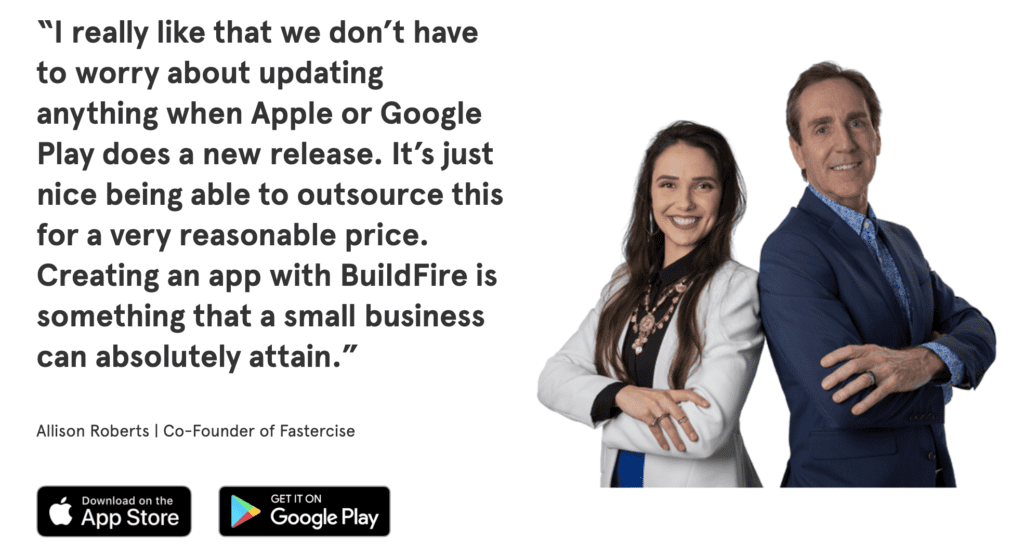
You can read more about the Fastercise mobile app and its success here.
By using an app builder, you only have to focus on the actual building process. Adding plugins and customizing them with your information, colors, and logos is easy for anyone to do.
Don’t expect to publish an app on your own. Leave the heavy lifting to the experts.
Expect a Learning Curve
App builders are easy to use and allow you to build an app without any coding experience.
With that said, there’s still a learning curve. Don’t expect to master the building process on the first day. You’ll need some time to get used to the dashboard, layout, and custom features.
It’s like anything else in life. Whether it’s starting a new job, learning a new skill, or even getting a new computer; there’s always a learning curve.
That’s why it’s so important for you to choose an app development platform with helpful tools and resources. Videos, tutorials, how-to guides, and everything else that we discussed earlier will drastically reduce the learning curve.
Prepare for any potential obstacles as well. Something might come up in your personal or professional life that could delay the progress.
In these circumstances, your app will still be here when you’re ready to continue. You’ll be able to pick up right where you left off.
Don’t Expect Your App to Ever Be Truly Complete
Your app isn’t done after the initial launch. There is always room for improvement. Even the most popular apps in the world come out with updates on a regular basis.
This is good news for you. You can probably get your app to market quicker than you initially thought if you focus on the core features first.
Get your app into the hands of users, and then worry about expansion or adding new functions down the road.
For example, the American Saddlebred Horse Association (ASHA) built a mobile app centered around improving an annual event that lasts for one week.
But if you review the ASHA mobile app customer success story, you’ll learn that they have big plans to improve the app in the future.
Another great example is the Ninja Zone mobile app. They make updates and edits on a regular basis as well.
So don’t delay the launch date to make sure your app is “perfect.” Focus on one or two core functions, and you can always add more down the road.
Conclusion
Building an app on your own is exciting.
With the help of mobile app development platforms, anybody can create an app in today’s day and age. You don’t need to know how to code or have any technical experience to do so.
Thousands of happy customers have built successful apps using BuildFire’s platform. You can check out our customer case studies to see additional examples.
There are certain things that you should expect with any great app development platform. This guide will help you find an app platform based on those expectations.
Get started building an app today. It’s free to try and takes less than one minute to sign up.